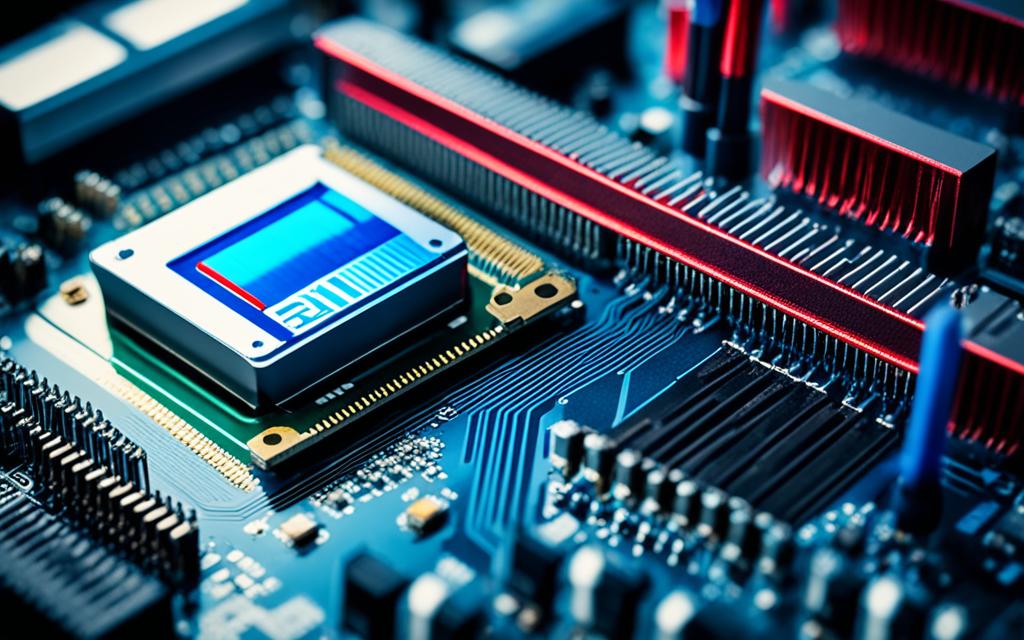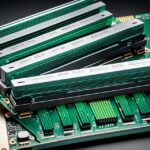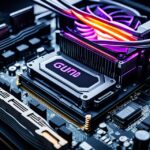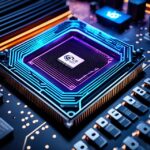Table of Contents
In the gaming world, making sure your CPU and GPU work well together is key. If your graphics card is faster than your CPU, you might not get the best out of your GPU’s power1. Knowing how your CPU and GPU affect your gaming is crucial for great play. If your CPU can’t keep up with your GPU, your games might stutter or be slow2. Luckily, using tools like MSI Afterburner lets you check if your CPU is holding back your GPU3. Picking the right resolution settings also helps make your gaming smoother.
Key Takeaways
- Use software to keep an eye on CPU and GPU work.
- A CPU bottleneck can really slow down your GPU.
- Choosing higher resolution settings might help with CPU bottlenecks.
- If your GPU is slow, lowering graphics quality could help.
- Checking and adjusting your settings regularly means better gaming.
Understanding CPU and GPU Bottlenecks
The relationship between the CPU and GPU is key for great performance in gaming and demanding tasks. CPU bottlenecks happen when the central processing unit can’t match the speed needed by the graphics processing unit. This mismatch can slow down games, causing a noticeable lag that spoils the fun.
On the flip side, a GPU bottleneck is when the graphics card can’t keep up with the CPU. This issue mainly affects how well the visuals are displayed, leading to poorer quality images.
For the best gaming setup, it’s crucial to have well-matched hardware. Nowadays, 8GB of RAM is a must for gaming, with 16GB preferred for smoother play and better multitasking4. Adjusting settings, like graphic details, can greatly influence performance. High settings might drop frame rates by up to 33%5.
To avoid problems, think about the speed and compatibility of both the CPU and GPU. Upgrading to SSDs can decrease loading times. A high refresh rate monitor can also make the most of a good graphics card4. It’s important to know how these parts work together to avoid bottlenecks and keep your system running smoothly.
Signs of a CPU Bottleneck
Spotting the indicators of CPU bottleneck is key for spotting problems in gaming. A big sign is when the GPU use is usually under 90%. For example, if a top-tier GPU like the RTX 4090 is only at 35% during a game, it probably means the CPU, maybe a Ryzen 5900X, can’t keep up. This mismatch can cause stuttering and big drops in frame rates, going from 150FPS down to 60 or 70FPS, hurting your gaming performance.
An overworked CPU shows many signs, like frequent frame rate drops and high CPU usage. Usage often nears 90-100% in heavy gaming moments. If your computer runs games that are hard on the CPU, with high frame rates and simple graphics, checking the performance helps you understand what’s happening. Tools like MSI Afterburner, Prime 95, or HWiNFO are great for spotting these issues by checking how parts of your computer are used while you play.
It’s crucial to keep your CPU and GPU balanced. If your powerful GPU isn’t being used much, annoying lags can make gaming frustrating. Learning to see these indicators of CPU bottleneck lets gamers fix and tweak their systems for smoother play. Knowing these signs means you can act fast to stop these problems from spoiling your game.
| Performance Indicator | Typical Result |
|---|---|
| GPU Utilisation Below 90% | Potential CPU Bottleneck |
| CPU Usage Near 100% | FPS Drops and Stuttering |
| Frame Rate Drops (e.g., 150FPS to 60FPS) | Imbalance in CPU and GPU Speeds |
Understanding these signs helps gamers keep their gaming performance at its best. Knowing when something’s wrong is the start to finding fixes, making things better, and enjoying your games more. Spotting these signs is the first step in fixing any gaming problem67.
How to Monitor Your CPU and GPU Performance
Understanding how well your CPU and GPU work together is key, especially for gamers. By using good monitoring tools, you can see how your computer’s parts perform. MSI Afterburner is a highly recommended tool for this. It shows real-time GPU usage and other important info.
For precise measurements, use the software while you’re playing games. This method gives an accurate view of GPU stress. You can then see if the CPU is keeping up. If not, your gaming could be getting held back because of a bottleneck8.
Here’s how to keep an eye on your CPU and GPU’s performance:
- Download and install MSI Afterburner from the official website.
- Launch the application and configure the settings as needed to display CPU and GPU metrics.
- Start your game and pay close attention to real-time utilisation rates of both components.
- Compare the utilisation rates; a significant disparity may indicate a CPU bottleneck.
By checking your performance regularly, you can spot what needs to be better. This ensures your gaming setup is as good as it can be. Knowing how crucial it is for your CPU and GPU to be in sync leads to smoother, more fun gaming8.
Does My CPU Bottleneck My GPU?
To find out if there’s a CPU bottleneck, look at how much each part is used during games. If the GPU’s working at 95-100%, the CPU is doing just fine at supplying data1. But, if the GPU’s effort is 80% or less, it means the CPU might be too slow9.
A low GPU effort with a busy CPU hints at performance issues9.
Identifying Utilisation Rates
Monitoring tools are key for this analysis. With something like MSI Afterburner, you can watch CPU and GPU stats in real-time10. This helps compare your setup to what’s considered best. It shows if your parts work well together or if it’s time for an upgrade, like moving to i5 or Ryzen 5 CPUs with a matching GPU10.
Using Tools Like MSI Afterburner
MSI Afterburner is a top choice for checking if your CPU and GPU are well-matched. It shows ongoing CPU and GPU workloads, aiding in hardware upgrade decisions10
These tools can reveal performance issues that need fixing. Some gamers find mismatching CPUs and GPUs spoil the fun1. For example, matching a high-end graphics card with an old CPU like the i7-2600 can waste the graphics card’s power10.
Common Causes of CPU Bottlenecks
Knowing what leads to CPU bottlenecks is key for keeping games and tasks running smoothly. These issues often come from not having the latest hardware or when too many programs want to use the CPU at the same time. By understanding the causes, users can make their computers work better and faster.
Outdated Hardware and Resource Competition
Old computer parts may not keep up with new apps and games. This can cause the bottlenecks, especially if a server is too busy and needs an upgrade for tough tasks11. When many apps run at once, they fight for the CPU’s attention. The more apps that start when you turn on the computer, the less power there is for games. This can really slow things down because the computer can’t decide where to focus its resources.
Background Processes and Their Impact
Apps running in the background can slow down your computer. Web browsers and streaming can take up too much CPU power. This means your games or other programs won’t run as well12. If your computer uses the hard drive too much, it might need more RAM. Not having enough RAM makes your computer slow because it uses the hard drive, which is slower. Too much pressure on the CPU can cause freezes, crashes, and errors. So, it’s important to keep an eye on your system and think about upgrading parts if needed11.
| Cause of Bottleneck | Description | Possible Solutions |
|---|---|---|
| Outdated Hardware | Older components that cannot cope with current demands. | Upgrade CPU or other components. |
| Resource Competition | Multiple applications using CPU resources simultaneously. | Close unnecessary background applications. |
| High Memory Usage | Insufficient memory causing reliance on slower storage methods. | Add more RAM to the system. |
Solutions to Minimise CPU Bottlenecking
To boost gaming, addressing CPU bottlenecking is key. Players can see better performance with several steps. These make sure the CPU can handle tough gaming well.
Adjusting In-Game Settings
Changing game settings helps reduce CPU bottleneck troubles. If you lower settings like how many people are in a game or how things move, the CPU does less work. This lets the GPU do more, which can make games run smoother. Also, playing at a higher resolution shares the load between the CPU and GPU. This makes bottlenecks less likely. Gamers often find these tweaks raise their FPS, making gameplay smoother1314.
Closing Background Applications
Shutting down extra programs is another smart move. Apps that run in the background, like web browsers, use up CPU power. By turning them off, your CPU performs better, especially during heavy gaming1514.
Upgrading Your Hardware
If you want lasting improvements, think about hardware upgrades. Getting a stronger CPU can fix bottleneck issues, especially with a top-notch GPU. It’s also good to regularly upgrade other parts, like RAM and graphics cards. This boosts your system’s performance and your gaming quality1315.
Conclusion
Knowing how CPU and GPU work together is key for the best gaming. Realising when and why bottlenecks happen lets gamers act smartly. This could mean checking performance or upgrading parts.
Fixing bottlenecks smooths out games, making playing more fun. It’s critical to spend time figuring out what your hardware can do. Use trustworthy tools to check your system’s abilities.
Thinking about upgrades based on what you learn boosts your gaming power. The right moves can perfect your gaming experience. You get to dive deep into the games you love.
Improving your system pays off with better frame rates and games that feel better. It’s all about knowing more to play better. This puts you ahead, ready to tackle any game challenge.
For tips on checking and boosting your PC’s specs, check out this guide16. It’s a great resource for gamers aiming for the top.
FAQ
What is a CPU bottleneck and how does it affect gaming performance?
A CPU bottleneck happens when the CPU is too slow for the GPU. This leads to worse gaming performance. You might see fewer frames per second and stuttering in games.
How can I tell if my CPU is bottlenecking my GPU?
Check the usage rates of your CPU and GPU during gaming. If the GPU’s usage is often below 95% but the CPU’s is close to 90-100%, your CPU is the issue.
What tools are recommended for monitoring CPU and GPU performance?
A: MSI Afterburner is a favoured tool for checking CPU and GPU performance. It helps you see their workload as you play, indicating any potential bottlenecks.
What factors can lead to CPU bottlenecks in my gaming setup?
A few things can cause CPU bottlenecks. Older hardware not keeping up with new GPUs is common. Also, programmes running in the background can take CPU power away from games.
How can I reduce CPU bottlenecking to improve gaming performance?
To tackle CPU bottlenecking, try lowering your game’s settings. Also, shut down apps you’re not using. You might even need to upgrade your hardware to match your GPU’s needs.
Source Links
- https://www.pcworld.com/article/1955495/pc-bottlenecks-cpu-or-cpu-limiting-gaming-performance.html – PC bottlenecks explained: How to know if your CPU or GPU is limiting games
- https://www.howtogeek.com/cpu-or-gpu-bottleneck-how-to-tell-and-which-is-worse/ – CPU or GPU Bottleneck? How to Tell (and Which Is Worse)
- https://www.hp.com/us-en/shop/tech-takes/is-my-cpu-bottlenecking-my-gpu – Is My CPU Bottlenecking My GPU | HP® Tech Takes
- https://www.intel.com/content/www/us/en/gaming/resources/what-is-bottlenecking-my-pc.html – What Is Bottlenecking My PC? – Intel
- https://forums.flightsimulator.com/t/cpu-bottlenecked-or-main-thread-limited-try-this/548617 – CPU Bottlenecked or Main thread limited? Try this
- https://www.partitionwizard.com/partitionmagic/cpu-gpu-bottleneck.html – CPU & GPU Bottleneck: What Are They and How to Fix Them? – MiniTool Partition Wizard
- https://www.makeuseof.com/find-if-cpu-bottlenecking-pc/ – The Easiest Way to Know if Your CPU Is Bottlenecking Your PC
- https://www.pocket-lint.com/is-your-pc-bottlenecking-how-to-check-for-performance-problems/ – Is your PC bottlenecking? How to check for performance problems
- https://forums.tomshardware.com/threads/is-my-cpu-bottlenecking-my-gpu.3815815/ – Question – Is my Cpu Bottlenecking my GPU?
- https://community.spiceworks.com/t/is-this-gpu-a-bottleneck-for-my-old-cpu/957042 – is this GPU a bottleneck for my old CPU
- https://www.purestorage.com/knowledge/cpu-bottleneck.html – What Is a CPU Bottleneck? | Pure Storage
- https://pcpartpicker.com/forums/topic/214851-on-cpugpu-bottlenecking-in-games – On CPU/GPU bottlenecking in games – PCPartPicker
- https://www.linkedin.com/pulse/how-fix-cpu-bottleneck-5-tips-gamers-wish-would-have-known-were – How to Fix CPU Bottleneck;-5 Tips Gamers Wish Would Have Known Earlier
- https://store.hp.com/ukstore/tech-takes/is-my-cpu-bottlenecking-my-gpu – Is My CPU Bottlenecking My GPU? | HP® Tech Takes
- https://www.wepc.com/tips/cpu-gpu-bottleneck/ – CPU and GPU bottleneck: How to fix a bottleneck in your PC
- https://www.lenovo.com/us/en/glossary/what-is-pc-bottleneck/ – How does PC Bottleneck affect performance?












